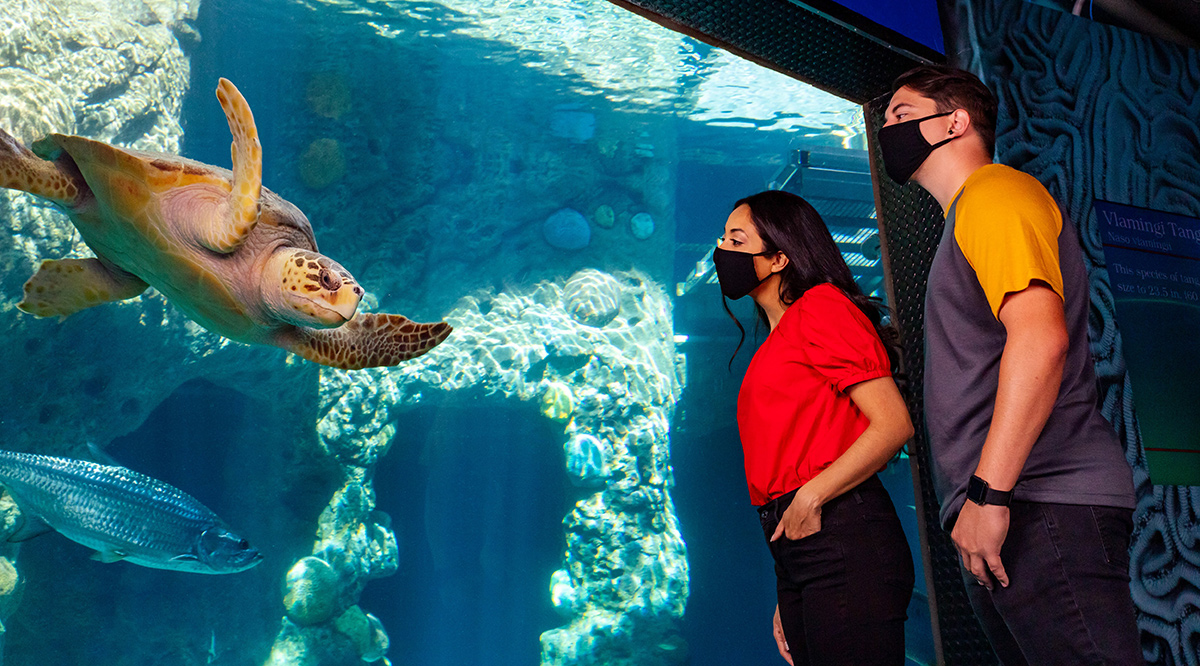
The first time a staffer at The Florida Aquarium tested positive for the virus that causes COVID-19, anxiety shivered through the executive team. The chief operating officer called a medical doctor at nearby Tampa General Hospital (TGH) early one morning (“I think he woke her up,” says aquarium CEO Roger Germann) asking what to do: Shut down? Tell some employees to quarantine? Test them all?
Seetha Lakshmi, MD, an epidemiologist, asked a series of questions to assess the risk of a COVID-19 outbreak — which appeared to be minimal, because the employee had limited contact with workers and visitors and had recently been off for several days. Lakshmi guided the aquarium on informing staff about the test result, tracing the employee’s on-site contacts, and continuing its procedures to prevent coronavirus infections.
“She calmed us down,” Germann says.
That kind of personal attention is golden for businesses and schools trying to operate safely during the pandemic — and more and more of them are getting that assistance from university hospitals that created consulting services to help organizations protect their staff and customers from the virus.
Branded with such uplifting names as Reopening America, Safe to Return, and Healthy Restart, these health system initiatives partner with local businesses to create COVID-19 safety plans, conduct walk-throughs on-site to assess risks and establish protocols, run events to educate employees about the virus, provide expedited virus testing for staff, and update leaders about how the latest COVID-19 findings might affect their safety policies.
The partnerships give hospitals new ways to apply what they learned from protecting their staff and patients from COVID-19 to meet an expanding public health need outside their doors.
“We see this as an extension of our role to slow the spread of the virus in the community,” says Joan Zoltanski, MD, who oversees the Healthy Restart initiative at University Hospitals in Cleveland.
Growing need
Since the start of the pandemic, doctors and other staffers at hospitals around the country have been fielding calls from local businesses, schools, and government agencies about how to stay open or reopen safely. Many staff have been happy to help, but in some places the volume of requests convinced administrators they needed more than a take-it-as-it-comes approach.
“At our morning meetings, we kept hearing, ‘This company reached out to this doctor, this school and this church reached out to whoever they knew in the system to try to understand best practices,’” Zoltanski recalls. “We were all trying to answer these questions organization by organization. Our CEO said, ‘We’ve got to put some structure around this.’”
The process worked in somewhat the opposite direction at Ochsner Health in Louisiana: Donny Lawrence, vice president of business development, says his team contacted companies for which Ochsner already provides employee health services, asking if they needed help dealing with COVID-19.
“It was overwhelming,” Lawrence says of the response. “With little to no information available about the virus back then, they basically said, ‘We don’t know what’s going on with this thing.’”
Although medical schools and teaching hospitals routinely provide free COVID-19 resources for the public — through website resources, live webinars, and conference calls — some organizations want a more personal relationship customized to their needs. And they are willing to compensate the health systems for the staff time required to provide that.
“Some of them [businesses] didn’t even know where to begin because there’s so much information out there,” Zoltanski says.
To cut through the information overload, the health systems offer a range of consultation arrangements, typically led by high-level subject matter experts — such as chiefs in epidemiology, infectious disease, and environmental hygiene — backed by a bench of specialists from throughout the systems who jump in as needed to address details. Their clients range from single-site establishments and local sports teams (University Hospitals works with the Cleveland Browns) to sprawling businesses and school systems (New Jersey’s Hackensack Meridian Health (HMH) advises the Bell Works research and retail hub and the Rumson School District).
While the primary goal is to contain the virus, another is to make staff and visitors confident about how these sites are containing the virus.
“The hope is to give people a level of comfort that these businesses didn’t come up with the opening plans on their own,” says Michael Geiger, vice president of Care Transformation Services at HMH, which created the Reopening America initiative. “They [schools and businesses] can say they built these plans with the endorsement of New Jersey’s largest health care network.”
Learning the worries of businesses and schools
The confusion and concerns of businesses and schools mirror those of the public, then go beyond.
“There are lots of questions about masks versus social distancing,” says Peggy Thompson, RN, director of infection prevention at Tampa General Hospital, which offers TGH Prevention Response Outreach. “Do you have to do both? What if you have people who can’t wear masks” because of breathing problems?
Many businesses are wary about mandating masks and social distancing for customers, as such mandates have become flashpoints for debates about personal liberty. Before it reopened after a two-month precautionary shutdown this spring, The Florida Aquarium drew up a safety plan that did not require guests to wear masks — then added the requirement at the recommendation of TGH.
“Being a science-based organization, we decided that that was the right thing to do, even if it cost us some visitors,” says Germann, the CEO.
On the other hand, aquarium leaders were initially anxious about whether they could keep visitors far enough apart throughout the facility, where the foot traffic sometimes flows through spaces too tight for passers-by to remain six feet apart.
“They said that if somebody just passes somebody else, if they have the masks on, they are probably going to be okay,” Germann says. “They helped take some of the anxiety off us, by not overthinking some things.”
As for the coronavirus tests — it seems the more that someone reads about them, the more confused they get.
“It’s a lot of education about tests,” says Geiger at HMH. “The sensitivity of tests; the accuracy; when you use one test versus another. How often do I need to test [the staff]? What happens if somebody comes back positive?”
Testing is one of several complicated subjects for which health experts explain the science, but they often advise business leaders to avoid getting mired in the minutia of it all. Pull back, they advise, to stick to the core principals of the safety plan.
“What we are constantly reinforcing is the basics,” Geiger says. “Hand washing. Social distancing. Wear a mask.”
While that advice goes for individuals as well, businesses and schools confront issues that most people don’t think about — like indoor air flow. How often should air be circulated through the heating and air conditioning? What filters block the coronavirus? Those questions create a demand not for doctors, but for experts in facility design and common spaces.
“One of our most in-demand people is our director of safety; she’s an industrial hygienist,” says Zoltanski at University Hospitals. “She thinks about air quality and filtration. How many times do you have to turn the air over in an operating room to make sure it’s clean? What’s the right filter for a virus versus a bacteria?”
Air quality is one of the many concerns that make schools — those that have brought back students and teachers — more challenging to safeguard than most businesses.
“Schools are complicated,” says Lawrence at Ochsner Health. “They have employees” responsible for the safety of themselves and others; “they have kids” whose behavior can be difficult to control; “and they’ve got parents in the mix” with ideas about what schools should and should not require of their children.
Some of the health systems assign specialists from their pediatric departments to help schools draft and enforce protocols.
“There’s been a lot of apprehension around masking. How could you possibly think a first grader would wear a mask?” Zoltanski says. “We were able to say, ‘They do it in our hospital every day.’ We share how we get them to do it — our challenges and how we overcome them.”
Hospitals stress core messages
Ultimately, the relationship between the health systems and the businesses and schools they consult goes beyond the recommendations they put on paper.
For starters, the health systems stress that there are no sure answers to all COVID-19 questions, and some answers will change as scientists continue to learn about the virus.
“We’re not talking about risk elimination,” says Lawrence at Ochsner Health. “We’re going to tell you what is safe, safer, and safest. You as a business owner can decide which portion of the risk you want to take on.”
That message is important as business and school leaders weigh the implications of various safety procedures, including what they want to impose on their staff, students, and customers, how much money they want to spend, and how some procedures might affect their operations.
“We reinforce to our clients that our expertise is health care,” Geiger says. “We don’t pretend to know the intricacies of their industry.”
For example, The Florida Aquarium did not implement a TGH suggestion to take the temperature of all visitors. The reliability of that procedure to detect a COVID-19 infection remains too uncertain to justify imposing that additional process on staff and guests, Germann says.
Of course, scientific knowledge about that might change — in which case clients can contact someone at the health system for advice. That continuing relationship can be as valuable to clients as the initial planning.
“I view it as an ongoing partnership,” says Thompson at TGH. “They will reach out with questions long after the initial contract has been fulfilled. Maybe they run into issues they hadn’t anticipated.”
As part of that relationship, TGH and HMH each provide display materials for businesses to show how they developed their safety procedures in partnership with either of those health systems. The materials, which include social distance markings on floors, signs for windows, and badges for websites, add another level of confidence for staff and visitors.
These projects make health care workers feel better as well.
“It’s been really rewarding,” Thompson says. “To feel that I can make a difference in outcomes in preventing a disease from spreading brings a new experience of professional satisfaction.”
